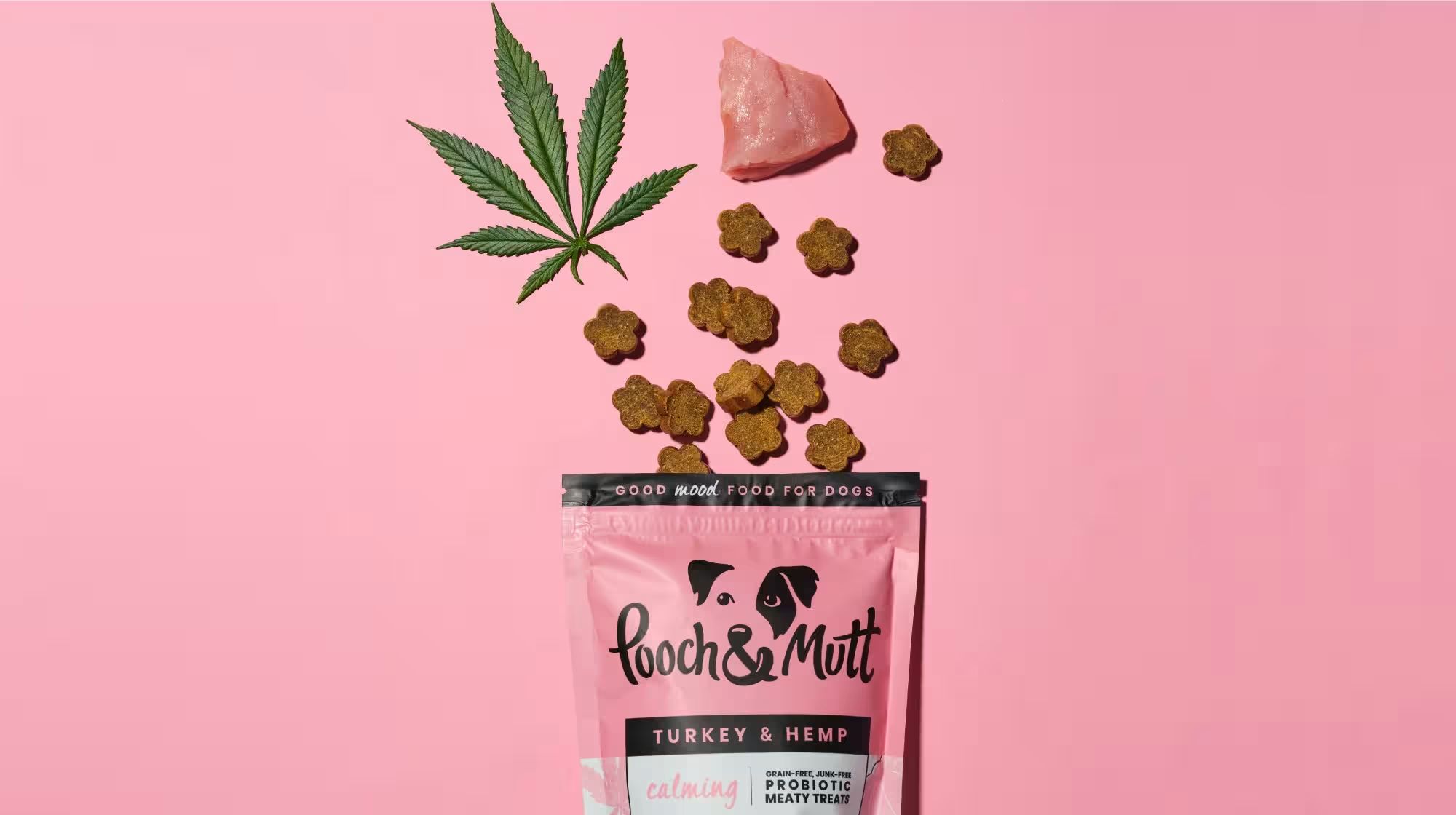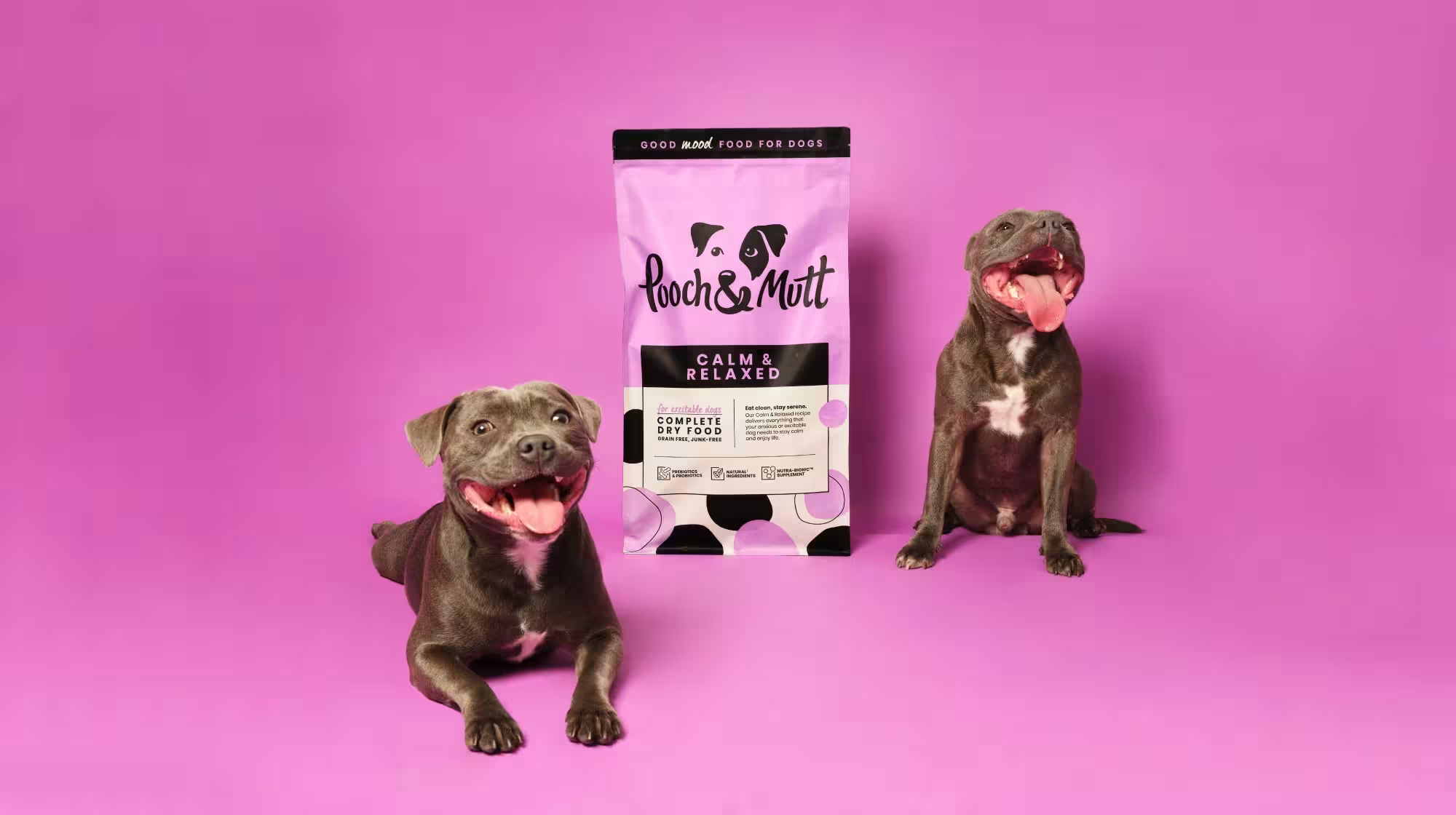If there was ever a pet that’s alert to protecting their human at all costs, it’s dogs. However, just like with humans, an overly active ‘fight or flight’ response in dogs can grow to be a problem if it means they become jumpy, yappy or fearful at common triggers throughout the day.
Dogs with anxiety can become overprotective or panicky at anything - from a stranger walking past the window to an umbrella being put up.
This is an extremely common problem; in fact, a recent Finnish study of almost 14,000 dogs (1) found that 72.5% of them demonstrated anxious behaviours (!), with noise anxiety being the most prominent scare factor.
Despite its prevalence, it’s upsetting as a dog owner to see your dog panicked or in distress when you just want them to feel safe and calm at all times. The good news: as anxiety is as much a physical condition as it is mental, there are plenty of ways you can integrate calming, soothing ingredients into your dog’s diet in order to help them react more rationally to life’s unpredictable stimuli.
But do anxiety supplements for dogs actually work? Read on for our expert tips on the best anxiety supplements for dogs.

What can I give my dog for anxiety?
With symptoms such as a raised heart rate, digestive issues, excessive barking, aggression or pooping in the house, it’s of no surprise that concerned human parents of anxiety-ridden dogs will do anything to soothe their pup’s symptoms.
Though some cases are trickier than others, luckily there are plenty of treatments available to induce calmness in your pup - from specialist dog beds to toys with heartbeats, and anxiety medications. However, nutrition is a big one.
It’s important not to overlook the huge impact of diet when it comes to your dog’s mental health (as they say, everything begins in the gut) and as well as making sure your pooch is receiving all the vitamins and nutrients they need, there is a range of calming supplements for dogs that could help (2).
What calming supplements for dogs to try
Read on for some common, all-natural anxiety supplements for dogs and how they can help to ease your pup’s anxiety symptoms.
Do probiotics help with dogs’ anxiety?
In basic terms, probiotics are digestible ‘good bacteria’ that contribute to a peaceful and balanced gut flora.
When there’s a balance of good bacteria in the gut, it has positive impacts all around your dog’s body; but certain strains of probiotics are specifically linked to the gut-brain axis, i.e. the more ‘brain-based’ anxiety symptoms in dogs such as panic, aggression and anxiety.
Bifobacterium longum (B. longum) for example, is a specific probiotic strain that has been proven to reduce stress in dogs (3). Look out for this ingredient when shopping for probiotic supplements for anxious dogs. You can read about Prebiotics and dog anxiety here .
Does hemp oil work for dogs’ anxiety?
Don’t worry, we’re not asking you to spark up a joint for your pooch - but hemp oil has been proven to have calming effects on dogs (and people) due to the unique therapeutic properties of cannabinoids.
It’s completely safe, as properly produced hemp oil contains slim to no tetrahydrocannabinol (THC), which is what contributes to the woozy, intoxicated effect cannabis is known for. Instead, it has cannabidiol (CBD), a soothing substance which helps with anxiety, epilepsy, inflammation and more.
Can dogs have CBD oil to calm anxiety?
On that note, CBD oil is derived from hemp products, and though there’s no solid scientific evidence of its impact, there is far-reaching anecdotal evidence of its anti-inflammatory properties, cardiac benefits, anti-nausea effects, appetite stimulation and anti-anxiety.
Just as with hemp oil, CBD is made with cannabidiol (literally what CBD stands for) rather than the psychoactive substances associated with marijuana.
There’s no harm in testing whether CBD products have a soothing effect on your dog - there are many CBD-infused dog treats on the market. As with any alternative medicine, be wary of side effects, and check with your vet before administering.
Does lavender help dogs with anxiety?
Lavender as an essential oil has well-known calming properties that work on dogs as well as humans. Though toxic in large quantities, lavender does appear in small amounts as an ingredient in calming dog treats.
High quality lavender oil can also be put into an air diffuser to send a pleasant, sleep-inducing scent into the air, or it can be applied topically to your dog’s skin to soothe irritation and itchiness and encourage a winding down effect.
Just be sure to use lavender oil sparingly and ensure it’s of pure quality. It’s a good idea to check with a vet too, to be certain it won’t interact with any other medications your dog is using.
Can supplements reduce anxiety in dogs?
Supplements that contain any of the above ingredients - a mixture of nutritious foods, probiotics and herbal remedies, for example - can be a great route to ensuring your dog feels safe and calm from the inside out as he moves through the unpredictability of his day.
When looking at ingredients, L-Tryptophan is a key name to look out for. It’s an amino-acid which helps induce serotonin, the ‘happy hormone’, which has been shown to reduce stress in dogs (4) and is found in foods such as poultry and dairy. Pooch & Mutt’s Calming Probiotic Meaty Treats , for example, contains turkey, which is rich in L-Tryptophan - as well as calming hemp and valerian root.

Supplements containing other natural calming aids, such as chamomile, can also be effective, whereas a probiotic supplement for dogs which boosts their gut health is a great choice, as it will ease your dog’s digestive issues while simultaneously calming their mood and wellbeing.
How to treat dog anxiety at home
Of course, as with any health treatment, a holistic approach is usually the most effective. This means as well as dietary changes, toys, vitamins and nutrients and calming supplements, you might want to consider some behavioural work with your dog to reduce the panicky reactions to certain stimuli.
This could be as simple as training sessions and counterconditioning exercises, or a period of slow exposure therapy so that your dog increasingly gets used to things that usually triggers them.
As well as introducing the supplements mentioned above, try chatting to your vet about dog training or visiting a behavioural therapist. Though anxiety has a range of causes and manifestations in dogs, it’s definitely worth your time getting to the root of the cause and finding ways to boost your pup’s happiness and sense of calm.
Calming Range
-

 from
fromCurrent price: £41.49
The Calm & Relaxed Bundle -

 from
fromCurrent price: £3.99
Calming Probiotic Meaty Treats -

 from
fromCurrent price: £8.49
Calm & Relaxed Dry Food -

 from
fromCurrent price: £5.99
Calm & Relaxed Bone Broth -

 from
fromCurrent price: £4.99
Calming Fish Hide Chews -

 from
fromCurrent price: £19.99
Hemp Chewies -

 from
fromCurrent price: £3.99
Calming Dental Sticks For Dogs -

 from
fromCurrent price: £1.99
Calm & Relaxed Complete Wet Food
To try to improve your dog’s anxiety with all-natural supplements, take a look at the Pooch & Mutt range of calming food and treats for dogs . Or get in touch with us to chat about what works for your dog’s anxiety.





